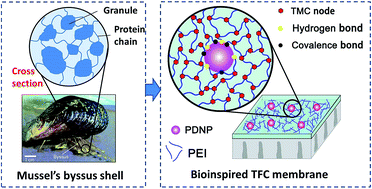Dopamine chemistry arising from marine mussel bioadhesion principles has attracted growing interest in designing and fabricating robust thin films/membranes for various chemical separation processes. In this study, inspired by the whole adhesion system of marine mussels, polydopamine nanoparticles (PDNPs) are employed to fabricate thin-film composite (TFC) membranes via conventional interfacial polymerization method. To be specific, PDNPs are dispersed into the aqueous polyethyleneimine (PEI) solution so as to construct “cross-linked particles in matrix” architectures. The incorporated PDNPs are found to play two major functions: (1) PDNPs reduce the hydrophilicity of membrane surface and enhance the permeate flux of non-polar organic solvents; (2) PDNPs react with PEI and result in covalent bonding between fillers and polymer matrix, which not only effectively inhibits the chain mobility and enhances solvent resistance, but also enables size-dependent selectivity. Compared with the three-layer composite membrane in which a polydopamine interlayer is present between the PEI layer and the porous support layer, the TFC membrane with mixed-matrix active layer shows enhanced swelling resistance and rejection ability, hinting that PDNPs can reinforce the entire active layer of the membrane, rather than merely the interfacial region. In addition, the gradual increment of rejection ratio and slight decrement of flux during a constant 720 min test show excellent operational stability of membrane.

